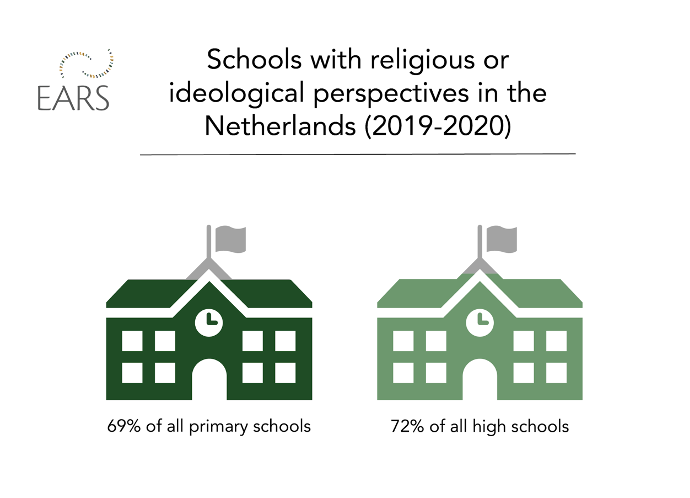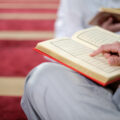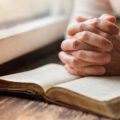Dutch Religious Education: A fine line?
Dutch Religious Education: A fine line?
The vast majority of Dutch schools teach from a religious or ideological perspective. However, the balance between freedom of religion and freedom of education is sometimes under pressure.
This article is part of our series on the role of religion in education across Europe.
Dutch ‘public’ versus ‘special’ education
When looking at the relationship between religion and education in the Netherlands, we can see that it is quite clearly defined. While ‘public’ education is not based on any religious perspective, ‘special’ education schools are allowed to teach from a specific ideological point of view.[1] This ideology can be either religious or more pedagogical in nature.[2] Schools that educate from a certain religious perspective can compel their teachers to share that particular perspective. However, no school is allowed to discriminate, by rejecting certain students or teachers, for example.[3]
The religious form of ‘special’ education is called ‘confessional special education’, and the non-religious variety is called ‘general special education’.[4] While the Netherlands is a secular state, both public and special education are financed by the government, as long as they adhere to certain quality standards.[5]
Facts and figures
The statistics paint a somewhat surprising picture, because the vast majority of Dutch schools actually teach from a religious or ideological perspective. According to the Central Bureau of Statistics (CBS), 69% of all primary schools and 72% of all high schools taught from a certain religious or ideological perspective in 2019-2020.[6] [7] When looking at the number of students attending those schools, one sees a very similar distribution, with 71.6% of all students attending special education.[8]

Explicitly religious education
As discussed above, only ‘confessional special education’ is explicitly religious. If we look at the last decade, we see a slight decline in the number of Catholic and Protestant schools, while the number of Islamic schools has grown by 60% in the same time period.[9] [10] There are only three Jewish schools in the Netherlands, which are all situated in Amsterdam. One of them has both a primary and high school, and has an orthodox orientation, where students are taught Jewish law, habits, and customs.[11] The other two are both secular schools; one primary school and one high school. All three schools have been in the news multiple times because they were targets of terrorism and antisemitism.[12] [13] While there are currently no Buddhist schools, there are about five explicitly Hindu primary schools in the Netherlands.[14]
Formative education
Besides all the options mentioned above, a third type of education is ‘formative’ education. This consists of extracurricular religious classes that parents can request for their children, in order to provide them with certain religious principles in their personal development. This form of education also receives government funding.[15] While the Catholic, Protestant, and Humanist varieties of this are by far the most popular, the Netherlands currently also has two Hindu teachers and five Buddhist teachers providing formative education in a number of schools.[16] One of the strict rules is that teachers who provide formative education cannot evangelise or pressure children to convert.[17]
What does Religious Education entail?
There is a difference between a ‘confessional special school’ – teaching from a certain religious point of view – and religious education as a subject in school. As seen in the numbers above, there are many confessional special schools in the Netherlands. Students of these schools will receive an education based on the dogmas of that specific religion. Most of the time, students will also come from a family that follows that religion, although these numbers are declining at many schools.[18] In school, learning about other religions is also included, but the extent of it can differ per school.[19]
In public schools, especially in primary school, classes on ideological movements in the Dutch multicultural society are mandatory. It is not explicitly stated that all religions should be taught.[20] If classes do incorporate religion, the five main religions covered are Christianity, Judaism, Islam, Hinduism, and Buddhism. Humanism is also part of the curriculum.[21]
Is Dutch education influenced by religion?
As seen above, the majority of schools teach from a religious or ideological perspective. Thus, one could say that religion and ideology have a great influence on education in the Netherlands. Christian schools (both primary and high school combined) are the largest group with 4,243 schools in total.[22] These numbers match with the fact that Dutch culture has strong Judeo-Christian roots.[23]
However, the balance between freedom of religion and freedom of education, and the necessity to make students feel safe at school, is sometimes under pressure. In 2020, education Minister Arie Slob led to national discussion because he said that orthodox Christian schools were allowed to ask parents to sign a document describing the ‘core values’ of the school, which included denouncing homosexuality. Parents who refused to sign were not allowed to send their children to that school. As many as one in five Dutch Christian reformed schools thinks it is ‘morally unacceptable’ to be in a gay marriage, but the schools are still obligated to treat students equally.[24] After receiving a lot of criticism, the minister took back his words.[25]
Christian reformed schools are not the only schools to receive negative news coverage. In September 2019, it was reported that Islamic schools in the Netherlands teach that Allah denounces homosexuality, that boys and girls should not look each other in the eye, and that people who have other religious beliefs should be killed. These Islamic schools follow the Salafi tradition: a fundamentalist and reactionary branch of Islam. Moreover, many of the organisations that these schools were part of were financed by the Gulf States, who promote their Salafi interpretation of Islam around the world. The Dutch inspection of education has recently started looking into this issue.[26]
In conclusion, it can be said that religion has a strong influence on education in the Netherlands. The majority of schools teach from a certain religious or ideological perspective. Of that majority, especially more orthodox-oriented schools have the greatest impact and, as seen above, are most frequently reported on. The Dutch reputation of being a highly secular nation is therefore only partially justified, since the state not only allows but directly subsidises the teaching of religious ideologies to its children. In the end, theory and practice do not necessarily meet.
Astrid Hamberg and Timo Pieters
Our team of analysts conducts research on topics relating to religion and society. In April, May and June 2021, we are focusing on the subject of education. Find out more on the EARS Dashboard.
[1] ‘Special education’ in the Netherlands can refer to two different types of education. One is called ‘speciaal’ in Dutch, which refers to special-needs education. In this article, ‘special education’ refers to the Dutch equivalent ‘bijzonder’, which means education from a religious or ideological perspective.
[2] Pedagogical is related to how to raise or educate a child. An example of a common pedagogical ideology in the Netherlands is Montessori education.
[3] Openbaar en bijzonder onderwijs.
[5] Openbaar en bijzonder onderwijs.
[6] StatLine – Onderwijsinstellingen; grootte, soort, levensbeschouwelijke grondslag. Specific numbers: 4627 of 6707 primary schools is 69%, and 466 of 650 high schools is 72%.
[7] Ibid. The number of students had a similar distribution with 71% of all (1,502,127) primary school students attending religious or ideological schools, and 73% of all (950,447) high school students attending public high schools.
[8] Ibid. 71% of all (1,502,127) primary school students, and 73% (950,447) of all high school students attended religious or ideological schools.
[9] StatLine – Onderwijsinstellingen; grootte, soort, levensbeschouwelijke grondslag.
[10] Islamitisch onderwijs groeit in tien jaar tijd met 60 procent.
[11] Joods Nederland: onderwijs – Cheider, Rosj Pina, Maimonides.
[12] Waarschuwing om geen keppel te dragen raakt open zenuw
[13] Directeur Joodse middelbare school: ‘Leerlingen vinden beveiliging fijn’
[14] De Stichting Hindoe Onderwijs: Welkom.
[15] Vormingsonderwijs: aandacht voor levensvragen op openbare basisschool. Our phone inquiries revealed that departments responsible for formative education had received a 10 million euro subsidy in 2009.
[16] The Hindu teachers have been employed since 2009, while the Buddhist teachers only emerged in 2018-19. These numbers were provided by a secretary over the phone.
[17] This was explained to us through phone correspondence with Vormingsonderwijs: aandacht voor levensvragen op openbare basisschool.
[18] Reformatorisch Dagblad | Laatste nieuws en achtergronden
[19] Voorstel basiscurriculum Levensbeschouwing en Religie
[20] Kerndoelenboekje basisonderwijs | Rapport
[21] Voorstel basiscurriculum Levensbeschouwing en Religie
[22] StatLine – Onderwijsinstellingen; grootte, soort, levensbeschouwelijke grondslag
[23] Hemel, E. van den. ‘(Pro)claiming Tradition: The “Judeo-Christian” Roots of Dutch Society and the Rise of Conservative Nationalism’ in: Braidotti, R., B. Blaagaard and E. Midden (eds.). Transformations of Religion and the Public Sphere: Postsecular Publics. Palgrave Macmillan 2014.
[24] Eén op de vijf reformatorische scholen vindt homohuwelijk moreel onacceptabel
[25] Slob krabbelt terug: verklaringen die homoseksuele identiteit afwijzen gaan te ver
[26] Grote zorgen Tweede Kamer na onderzoek salafistische moskeescholen






